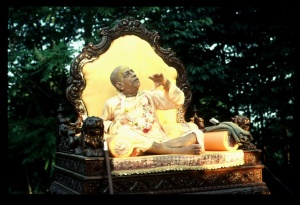CC Madhya 24.272 (1975)

A.C. Bhaktivedanta Swami Prabhupada
Below is the 1996 edition text, ready to be substituted with the 1975 one using the compile form.
TEXT 272
- nārada kahe,—“vyādha, ei nā haya āścarya
- hari-bhaktye hiṁsā-śūnya haya sādhu-varya
SYNONYMS
nārada kahe—Nārada Muni said; vyādha—my dear hunter; ei nā haya āścarya—this is not wonderful for you; hari-bhaktye—by advancement in devotional service; hiṁsā-śūnya haya—one becomes nonviolent and nonenvious; sādhu-varya—thus one becomes the best of honest gentlemen.
TRANSLATION
“Nārada Muni said, ‘My dear hunter, such behavior is not at all astonishing. A man in devotional service is automatically nonviolent. He is the best of gentlemen.
PURPORT
In this verse the word sādhu-varya means “the best of gentlemen.” At the present moment there are many so-called gentlemen who are expert in killing animals and birds. Nonetheless, these so-called gentlemen profess a type of religion that strictly prohibits killing. According to Nārada Muni and Vedic culture, animal-killers are not even gentlemen, to say nothing of being religious men. A religious person, a devotee of the Lord, must be nonviolent. Such is the nature of a religious person. It is contradictory to be violent and at the same time call oneself a religious person. Such hypocrisy is not approved by Nārada Muni and the disciplic succession.